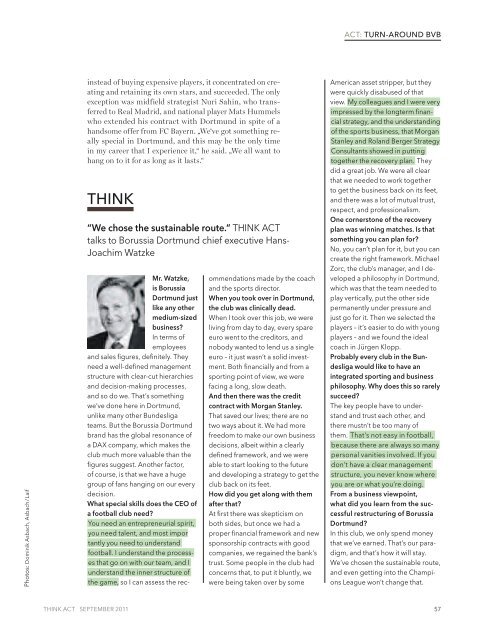You also want an ePaper? Increase the reach of your titles
YUMPU automatically turns print PDFs into web optimized ePapers that Google loves.
Photos: Dominik Asbach, Asbach / Laif<br />
instead of buying expensive players, it concentrated on creating<br />
and retaining its own stars, and succeeded. The only<br />
exception was midfield strategist Nuri Sahin, who transferred<br />
to Real Madrid, and national player Mats Hummels<br />
who extended his contract with Dortmund in spite of a<br />
handsome offer from FC Bayern. „We‘ve got something really<br />
special in Dortmund, and this may be the only time<br />
in my career that I experience it,“ he said. „We all want to<br />
hang on to it for as long as it lasts.“<br />
<strong>THINK</strong><br />
“We chose the sustainable route.” <strong>THINK</strong> <strong>ACT</strong><br />
talks to Borussia Dortmund chief executive Hans-<br />
Joachim Watzke<br />
Mr. Watzke,<br />
is Borussia<br />
Dortmund just<br />
like any other<br />
medium-sized<br />
business?<br />
In terms of<br />
employees<br />
and sales figures, definitely. They<br />
need a well-defined management<br />
structure with clear-cut hierarchies<br />
and decision-making processes,<br />
and so do we. That’s something<br />
we’ve done here in Dortmund,<br />
unlike many other Bundesliga<br />
teams. But the Borussia Dortmund<br />
brand has the global resonance of<br />
a DAX company, which makes the<br />
club much more valuable than the<br />
figures suggest. Another factor,<br />
of course, is that we have a huge<br />
group of fans hanging on our every<br />
decision.<br />
What special skills does the CEO of<br />
a football club need?<br />
You need an entrepreneurial spirit,<br />
you need talent, and most impor<br />
tantly you need to understand<br />
football. I understand the process-<br />
es that go on with our team, and I<br />
understand the inner structure of<br />
the game, so I can assess the rec-<br />
ommendations made by the coach<br />
and the sports director.<br />
When you took over in Dortmund,<br />
the club was clinically dead.<br />
When I took over this job, we were<br />
living from day to day, every spare<br />
euro went to the creditors, and<br />
nobody wanted to lend us a single<br />
euro – it just wasn’t a solid investment.<br />
Both financially and from a<br />
sporting point of view, we were<br />
facing a long, slow death.<br />
And then there was the credit<br />
contract with Morgan Stanley.<br />
That saved our lives; there are no<br />
two ways about it. We had more<br />
freedom to make our own business<br />
decisions, albeit within a clearly<br />
defined framework, and we were<br />
able to start looking to the future<br />
and developing a strategy to get the<br />
club back on its feet.<br />
How did you get along with them<br />
after that?<br />
At first there was skepticism on<br />
both sides, but once we had a<br />
proper financial framework and new<br />
sponsorship contracts with good<br />
companies, we regained the bank’s<br />
trust. Some people in the club had<br />
concerns that, to put it bluntly, we<br />
were being taken over by some<br />
<strong>ACT</strong>: TURN-AROUND BVB<br />
American asset stripper, but they<br />
were quickly disabused of that<br />
view. My colleagues and I were very<br />
impressed by the longterm finan-<br />
cial strategy, and the understanding<br />
of the sports business, that Morgan<br />
Stanley and Roland Berger Strategy<br />
Consultants showed in putting<br />
together the recovery plan. They<br />
did a great job. We were all clear<br />
that we needed to work together<br />
to get the business back on its feet,<br />
and there was a lot of mutual trust,<br />
respect, and professionalism.<br />
One cornerstone of the recovery<br />
plan was winning matches. Is that<br />
something you can plan for?<br />
No, you can’t plan for it, but you can<br />
create the right framework. Michael<br />
Zorc, the club’s manager, and I developed<br />
a philosophy in Dortmund,<br />
which was that the team needed to<br />
play vertically, put the other side<br />
permanently under pressure and<br />
just go for it. Then we selected the<br />
players – it’s easier to do with young<br />
players – and we found the ideal<br />
coach in Jürgen Klopp.<br />
Probably every club in the Bundesliga<br />
would like to have an<br />
integrated sporting and business<br />
philosophy. Why does this so rarely<br />
succeed?<br />
The key people have to understand<br />
and trust each other, and<br />
there mustn’t be too many of<br />
them. That’s not easy in football,<br />
because there are always so many<br />
personal vanities involved. If you<br />
don’t have a clear management<br />
structure, you never know where<br />
you are or what you’re doing.<br />
From a business viewpoint,<br />
what did you learn from the successful<br />
restructuring of Borussia<br />
Dortmund?<br />
In this club, we only spend money<br />
that we’ve earned. That’s our paradigm,<br />
and that’s how it will stay.<br />
We’ve chosen the sustainable route,<br />
and even getting into the Champions<br />
League won’t change that.<br />
<strong>THINK</strong> <strong>ACT</strong> SEPTEMBER 2011 57


